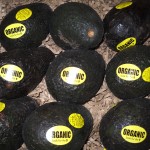The organic food industry is booming, with sales in the US increasing approximately 20% each year since 1990 (1). In the United States, organic farming is defined as farming without the use of pesticides, hormones, genetic modification, antibiotics or any other chemicals used during the farming process; however, it should be noted that organic farmers are permitted to use “approved” synthetic materials (1). Proponents of organic farming claim that organically produced foods contain less potentially toxic substances. It is generally true that organic produce is lower in pesticide residues than its conventionally grown counterparts, which makes sense because by definition organic produce is grown without the use of pesticides (1). That being said, the pesticide levels present in conventionally grown produce are still considered safe for human consumption (1).
Many consumers also feel that organic foods are more nutritious than the conventionally produced variety, but the evidence in favor of organics is mixed. Some studies have found organic foods to be more nutritious while others have not (1,2,3). More research in this area is necessary before these claims should impact buying decisions. While the evidence favoring organics may be uncertain, arguments for increasing fruit and vegetable consumption are pretty clear. Regular consumption of fruits and vegetables is important for general health and may decrease risk for various types of cancer (4,5,6). With that in mind, it is more important to focus on getting a variety of nutrient packed fruits and veggies into your daily diet, than it is to worry about whether or not they are organic. The American Institute for Cancer Research recommends that you should fill at least two-thirds of your plate with vegetables, fruits whole grains or beans at each meal (6). In addition to their cancer fighting potential, plant based foods can also help you manage your weight because they are energy dense and calorie poor (6). The bottom line is to eat mostly plant-based foods. If you want to eat organic there is no harm in doing so; however, an organic diet is not a necessary for your cancer treatment or for general health.
References
- Winter, Carl K., and Sarah F. Davis. “Organic foods.” Journal of Food Science 71.9 (2006): R117-R124.
- Palupi, Eny, et al. “Comparison of nutritional quality between conventional and organic dairy products: a meta‐analysis.” Journal of the Science of Food and Agriculture (2012).
- Dangour, Alan D., et al. “Nutritional quality of organic foods: a systematic review.” The American journal of clinical nutrition 90.3 (2009): 680-685.
- Lee, Jung Eun, et al. “Intakes of fruit, vegetables, and carotenoids and renal cell cancer risk: a pooled analysis of 13 prospective studies.” Cancer Epidemiology Biomarkers & Prevention 18.6 (2009): 1730-1739.
- van Duijnhoven, Fränzel JB, et al. “Fruit, vegetables, and colorectal cancer risk: the European Prospective Investigation into Cancer and Nutrition.” The American journal of clinical nutrition 89.5 (2009): 1441-1452.
- The New American Plate. American Institute for Cancer Research. http://www.aicr.org/reduce-your-cancer-risk/diet/. Accessibility verified: March 7, 2013.
